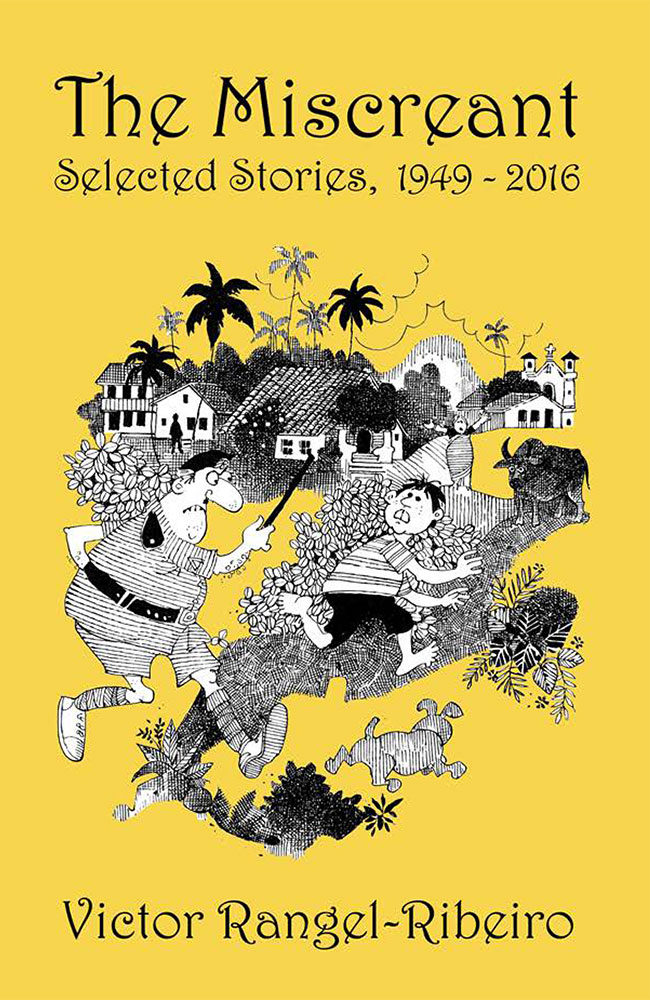Publishers of international
prose, poetry, art,
and literary hybrids.
Book
The Miscreant: Selected Stories 1949-2016
Having lived under and outlasted two globe-girdling empires, the Portuguese and the British, Victor Rangel-Ribeiro considers himself to be a pre-postcolonial writer, one of the last survivors of a dying breed. His new volume of short fiction includes 15 stories plucked from a long and illustrious career that began in the early 1940s, and is still ongoing. Seven stories deal with life in India; seven with the immigrant experience in New York. The fifteenth, “Dear J.C.,” takes us back twenty one centuries, to a Roman colony at the time of Cesar Augustus and Herod the Great. The collection thus spans continents and lifestyles as well as centuries. Although several stories share a common thread, no two stories are alike. Love features in some—from lust to self-delusion to poignant loss in the novella, “Loving Ayesha.” Other stories contrast the innocence of youth with the problems of old age. A number are very funny. In this collection, Victor Rangel-Ribeiro embraces a unique range of subjects, moods, and emotions, a diversity that reveals a master of storytelling.
Author: Victor Rangel-Ribeiro
Paperback : 238 pages
ISBN-10 : 0997779713
ISBN-13 : 978-0997779714
About the Author
Victor Rangel-Ribeiro was born in Goa, India, in 1925, when it was still a Portuguese colony, but he moved to Bombay in British India to complete his university studies, before moving to the United States in 1956 and becoming an American citizen. Having outlived two empires, the Portuguese and the British, at age 91 he now claims to be one of a vanishing breed of pre-postcolonial writers: His earliest stories appeared in print in colonial Bombay in the 1940s; he is still writing today, often far into the night.
Rangel-Ribeiro’s short fiction has appeared in such prestigious literary magazines as the Iowa Review, the North American Review, and The Literary Review, and also in his native India. His debut novel, Tivolem, set in Goa in 1933, won Milkweed’s National Fiction Prize and was declared by Booklist to be one of the twenty best first novels of 1997-98. Loving Ayesha, a short story collection, was published by Harper Collins (India) in 2003. Both Tivolem and Loving Ayesha made that country’s best seller list.
Rangel-Ribeiro writes with equal facility of life in colonial times in India, and life in the United States from the immigrant point of view. This explains why half of the stories in this book are based in India, spanning life in the 1930s, 1940s and 1950s, and the other half deal with the immigrant experience in the United States.
Rangel-Ribeiro’s interests include a life-long involvement in music. His music criticism appeared in the New York Times in the late 1950s. In the 1960s he ran a music antiquariat in New York City specializing in classical music. In 1977 he was appointed Music Director of the Beethoven Society in New York, and in three years steered that young organization to membership in the Lincoln Center for the Performing Arts. He has several books on music to his credit. He is currently working on a second novel, The Fires of Gangapur.
Dear Publisher of The Miscreant: I am afraid I must decline your request to supply a blurb for Mr. Rangel-Ribeiro’s book. The collection’s promiscuous expressive range—from moving love story to racehorse slapstick—confused this would-be blurbist terribly. That the stories take place everywhere from Bombay to Times Square added to his vertigo, while giving him whiplash. To make matters worse, there are so many stories, each better than the last, and each so different. But what made this would-be blurbist’s task entirely impossible was that, each time he arrived at a potentially honest, useful, and more-or-less accurate blurb, his laughter or his tears (or both) caused him to fall off his favorite chair, resulting in minor injuries and embarrassment and deleting the nascent blurb from his head. Please accept my sincere apologies and convey my regrets to the author.
—Peter Selgin, author of Swimming Lessons and The Inventors
The Miscreant & Other Stories is an exquisite collection of tales whose settings span centuries and continents, from Goa and Mumbai to Manhattan to the ancient Roman Empire. Whether describing the madcap antics of a village thief, the efforts of an elderly churchgoer to outwit the Angel of Death, or an Indian immigrant finding unexpected companionship in America, Rangel-Ribeiro brings both settings, often exotic, and people, always multifarious, to charming life. Underlying the quiet hilarity here are threads of spiritual wisdom and a heartwarming portrayal of human foibles.
—Donna Baier Stein, author of Sympathetic People and The Silver Baron’s Wife
Here is a book to be shared with your closest friends. The Miscreant presents a cast that includes misbehaving young men, squabbling couples, and frustrated lovers, and it occupies a geography that ranges from 1930s India to present-day New York City. Victor is genuinely fond of his characters, from the harried husband in the slapstick “Peter and the Ants,” which turns pest control into a new world war, to the desperate young man in “Loving Ayesha,” a story that weaves secular love, religious ardor, and India’s struggle for freedom from British rule into the book’s most unlikely and affecting centerpiece. It’s a fondness that gives this collection an unusual—and welcome—warmth.
—Robley Wilson, author of Terrible Kisses, Dancing for Men, and Who Will Hear Your Secrets?
As colorful as an Indian tapestry and as complex as the alleys of Kolkotta, so is the journey with Victor Rangel-Ribeiro’s stories. With his eloquent and humorous pen, the author treats the reader to a concert of sights, sounds and flavors as his life carries him from remote Goa and Mumbai to New York, with tales in which he always finds the tender, the comic and the absurd.
—Talia Carner, author Hotel Moscow, Jerusalem Maiden, China Doll and Puppet Child
"I admire [Serving House Books] for the quality work they’re putting out plus the notable writers they’re publishing."
Jack Smith, The Writer Magazine

